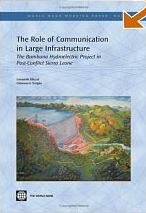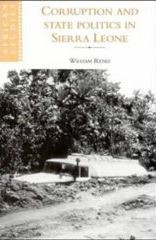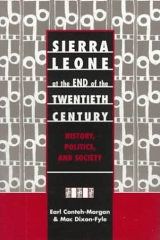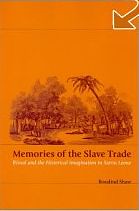Sierra Leone in the bookstore
"Conteh-Morgan and Dixon-Fyle have crafted a competent study that at once presents a comprehensive overview of this West African state while situating their analysis within the framework of major theoretical insights extant on politics in the developing world. The result is both a complete and concise study of Sierra Leone's political history from precolonial times up to and including the political convulsions of the late 1990s. What these scholars, themselves Sierra Leonean nationals, have succeeded in doing so admirably is interpreting for both the attentive and general public the outcome of 'politico-economic mismanagement and confusion' in Sierra Leone."
 This case study analyzes the role of communication as it applies to large water infrastructure projects through the example of the Bumbuna Hydroelectric Project in Sierra Leone. It describes how communication was used as an analytical tool to assess the political and social environment around the project and how the Communication Action Plan put in place an horizontal communication mechanism allowing key stakeholders to -be properly informed, express their concerns and be involved in the decision making process. The authors present the lessons learned in Sierra Leone and propose that stakeholder involvement and horizontal communication should be included, from the project inception, as a key ingredient for project design and implementation for all large infrastructure and hydropower projects.
This case study analyzes the role of communication as it applies to large water infrastructure projects through the example of the Bumbuna Hydroelectric Project in Sierra Leone. It describes how communication was used as an analytical tool to assess the political and social environment around the project and how the Communication Action Plan put in place an horizontal communication mechanism allowing key stakeholders to -be properly informed, express their concerns and be involved in the decision making process. The authors present the lessons learned in Sierra Leone and propose that stakeholder involvement and horizontal communication should be included, from the project inception, as a key ingredient for project design and implementation for all large infrastructure and hydropower projects.
 William Reno provides a powerful, scholarly yet shocking account of the inner workings of an African state. He focuses upon the ties between foreign firms and African rulers in Sierra Leone, where politicians and warlords use private networks that exploit relationships with international businesses to buttress their wealth and so extend their powers of patronage. This permits them to expand the reach of their governments in unorthodox ways, but in the process they undermine the bureaucracty of their own states. Dr Reno suggests that as the post-colonial state is eroded there is a return to the enclave economies and private armies that characterised the pre-colonial and colonial arrangements between European businessmen or administrators and some African political figures.
William Reno provides a powerful, scholarly yet shocking account of the inner workings of an African state. He focuses upon the ties between foreign firms and African rulers in Sierra Leone, where politicians and warlords use private networks that exploit relationships with international businesses to buttress their wealth and so extend their powers of patronage. This permits them to expand the reach of their governments in unorthodox ways, but in the process they undermine the bureaucracty of their own states. Dr Reno suggests that as the post-colonial state is eroded there is a return to the enclave economies and private armies that characterised the pre-colonial and colonial arrangements between European businessmen or administrators and some African political figures.
How is the slave trade remembered in West Africa? In a work that challenges recurring claims that Africans felt (and still feel) no sense of moral responsibility concerning the sale of slaves, Rosalind Shaw traces memories of the slave trade in Temne-speaking communities in Sierra Leone. While the slave-trading past is rarely remembered in explicit verbal accounts, it is often made vividly present in such forms as rogue spirits, ritual specialists' visions, and the imagery of divination techniques.
Drawing on extensive fieldwork and archival research, Shaw argues that memories of the slave trade have shaped (and been reshaped by) experiences of colonialism, postcolonialism, and the country's ten-year rebel war. Thus money and commodities, for instance, are often linked to an invisible city of witches whose affluence was built on the theft of human lives. These ritual and visionary memories make hitherto invisible realities manifest, forming a prism through which past and present mutually configure each other.



